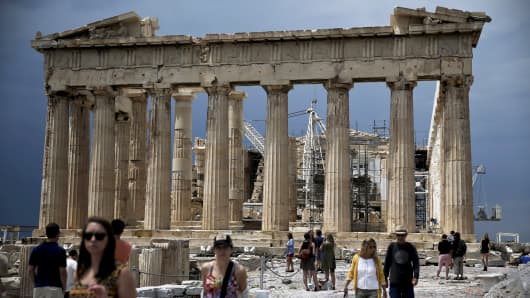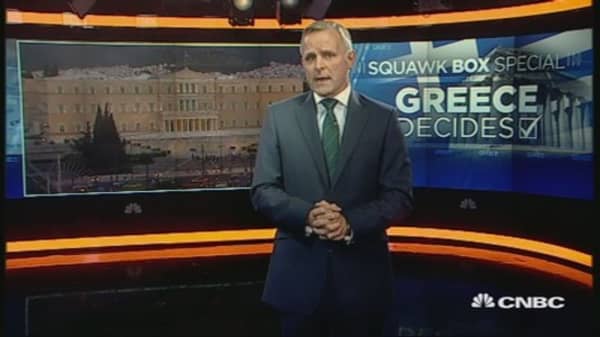
Alkis Konstantinidis | Reuters
People visit the Acropolis hill with the ancient Parthenon temple seen in the background, Athens, Greece.
In 1832, the Great Powers — Britain, France and Russia — declared Greece a monarchy and installed a Bavarian prince, Otto, as king. Otto sought new loans of 60 million French francs. The first two installments were paid out and used to settle previous debts to the British as well as to make payments to Bavaria to support the Bavarian army. The third tranche never came through because the economy was so poor and Otto was forced to declare bankruptcy.
During the following decades, Greece actually grew and expanded and its public debt grew accordingly. It paid compensation to the Ottomans for the acquisition of Thessaly and Arta. But the debt outpaced its ability to pay and by 1893 Greece was once again forced to declare that it was bankrupt.
At the beginning of the 20th century, Greece took up four external loans totaling 521 million francs to pay for servicing existing external debt, fighting in the Balkan Wars and for incorporating the new territory acquired during those wars. The Greco-Turkish War of 1919-1922 added to Greek debt and Greece continued to rely on foreign capital during the 1920's. By 1929, the debt had risen to 286.8 billion French francs. In 1932, Greece cut interest payments on its debt by 75 percent and suspended principal payments.
During the Second World War, Greece was occupied by Nazi Germany and Italy, and its productive resources were largely destroyed. To make matters worse, it was forced to provide a loan of 400 million marks to Germany to finance Hitler's operations in Greece. It suspended all interest payments and no principal or debt payments were made until 1963 meaning it was technically in default for 30 years.
Read MoreRobert Shiller's shocking call: Buy Greek stocks!
Greece evolved and the economy grew. By the time of its accession to the European Monetary Union, its debt-to-GDP ratio was slightly over 100 percent, well above the Maastricht Treaty target of 60 percent.
In the aftermath of the financial crisis in 2009, Greece began borrowing in epic fashion. In 2010 Greece was "rescued" by loans from their European partners and the IMF, whose main motivation may have been to provide breathing room for French and German banks that were heavily exposed to Greek debt. The debt that remained was unsustainable under any reasonable scenario about growth and two centuries of prior history suggests the logical policy would have been to default and restructure the debt to a sustainable level. The debt has now increased to 161 percent of GDP. Once again this is unsustainable.
Greeks have been ill served by their European allies, the IMF, and their government. By failing to acknowledge the inevitable in 2010 and assuming that Greece could reform itself and begin growing again and service its existing debt, the European allies and the government simply extended the pain and increased the damage to the Greek economy. They compounded the error in 2012 with further lending. Two centuries of history tell us what the inevitable outcome must be. Only after a default/restructuring occurs can Greece begin the long slow process of recovery.







